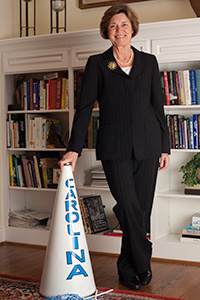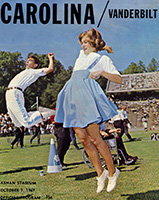More than Meets the Eye

Photo by Jordan Meyer

Courtesy of Priscilla Taylor
Today, it is hard to imagine Priscilla Patterson Taylor sleeping with a pistol under her pillow in Vietnam during the height of the Vietnam War. She knew she was not supposed to be there, but the woman who once donned a Tar Heel cheerleader's outfit has never shied away from the unconventional.
The moment she stepped foot on the campus of the University of North Carolina at Chapel Hill, Taylor began a journey that broke down barriers and opened doors for others. It was a journey that left an indelible set of footprints across the state of North Carolina.
“When I started, women were not admitted as freshmen unless they were in a health professions discipline; they could only transfer in as juniors,” Taylor says. She was an exception because her family lived in Chapel Hill. “I was the only woman in any of my classes.”
Despite the challenges, Taylor thrived in the classroom. “I had wonderful professors, and I just loved my time at Carolina,” she says.
In the end, Taylor earned her bachelor's, master's and doctorate—all from Carolina. “I'm one of those, ‘My blood bleeds blue,’” she says.
The trailblazing impulse that brought Taylor to the University also took her far across the globe. At the height of the Vietnam War, Taylor followed her husband, a Marine, to Southeast Asia.
“I traveled with him to Vietnam. Of course, women weren't supposed to be there,” Taylor says. “We pretended we weren't married, but his superior officer found out and sent me home immediately.”
“It was a wonderful adventure at the time,” Taylor says. “But it was probably a crazy adventure.”
“I think you'll find everywhere that the alumni of our graduate schools really are contributing to the welfare of the state.”
When her husband returned from Vietnam, the couple moved to Greensboro while Taylor continued her studies in Chapel Hill. Taylor successfully completed her doctorate in Organizational Behavior at the Business School, overcoming many of the obstacles women graduate students faced at the time. “Graduate students usually received financial support by being research assistants,” she explains, “so when I started the program, I met with an administrator to request an assistantship. His response was, ‘Oh, honey, I can't give you one, because I have too many men who need it to support their families.’”
“I blinked. I knew I should have said something, but I didn't,” says Taylor.
After completing her doctorate, Taylor stayed in Greensboro and proceeded to leave a deep footprint on the Gate City.
Taylor served as a leader on the boards of several important nonprofit organizations like the United Way and YWCA. She eventually became Executive Director of the Cemala Foundation, an organization dedicated to improving the quality of life in Guilford County.
After the loss of the city's textile industry, Taylor spearheaded an innovative collaboration among Greensboro foundations to revitalize the city's economy. With her leadership, the foundations joined forces to rebuild the neglected downtown district, improve the public schools and promote small business creation.
“By ourselves, we couldn't make much of a difference, but by working together, we could,” says Taylor. “That's what I consider my major accomplishment at the foundation.”
Now Taylor has a new role, one she believes to be her most challenging yet: a member of the University of North Carolina system Board of Governors.
“I believe the University system is the state's biggest asset and it's such a huge responsibility for those of us who are on the Board of Governors to be sure it's managed well—that it's doing what the folks of North Carolina need it to do,” Taylor says. “It has made the difference for so many families and so many people. It's one of the reasons that the state has been so progressive. We are looked to as the model for public higher education by every other state in the United States.”
Taylor says that her graduate degree made a difference for her; now she works to ensure those opportunities are available to others, to the benefit of the entire state. She says, “The professors who teach, the graduate students who create solutions for problems that the state has—I think you'll find everywhere that the alumni of our graduate schools really are contributing to the welfare of the state.”
• Jeremy Cramer


